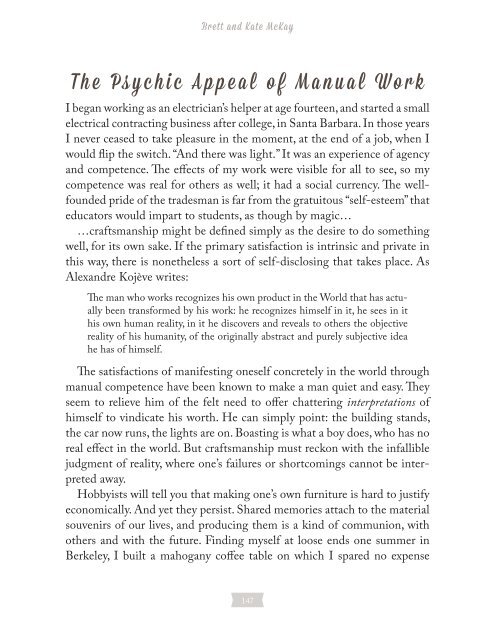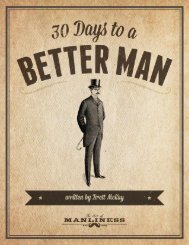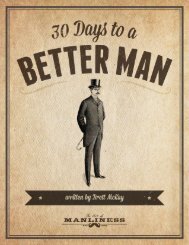588b1c58c8a68278cfc28555
You also want an ePaper? Increase the reach of your titles
YUMPU automatically turns print PDFs into web optimized ePapers that Google loves.
Brett and Kate McKay<br />
The Psychic Appeal of Manual Work<br />
I began working as an electrician’s helper at age fourteen, and started a small<br />
electrical contracting business after college, in Santa Barbara. In those years<br />
I never ceased to take pleasure in the moment, at the end of a job, when I<br />
would flip the switch. “And there was light.” It was an experience of agency<br />
and competence. The effects of my work were visible for all to see, so my<br />
competence was real for others as well; it had a social currency. The wellfounded<br />
pride of the tradesman is far from the gratuitous “self-esteem” that<br />
educators would impart to students, as though by magic…<br />
…craftsmanship might be defined simply as the desire to do something<br />
well, for its own sake. If the primary satisfaction is intrinsic and private in<br />
this way, there is nonetheless a sort of self-disclosing that takes place. As<br />
Alexandre Kojève writes:<br />
The man who works recognizes his own product in the World that has actually<br />
been transformed by his work: he recognizes himself in it, he sees in it<br />
his own human reality, in it he discovers and reveals to others the objective<br />
reality of his humanity, of the originally abstract and purely subjective idea<br />
he has of himself.<br />
The satisfactions of manifesting oneself concretely in the world through<br />
manual competence have been known to make a man quiet and easy. They<br />
seem to relieve him of the felt need to offer chattering interpretations of<br />
himself to vindicate his worth. He can simply point: the building stands,<br />
the car now runs, the lights are on. Boasting is what a boy does, who has no<br />
real effect in the world. But craftsmanship must reckon with the infallible<br />
judgment of reality, where one’s failures or shortcomings cannot be interpreted<br />
away.<br />
Hobbyists will tell you that making one’s own furniture is hard to justify<br />
economically. And yet they persist. Shared memories attach to the material<br />
souvenirs of our lives, and producing them is a kind of communion, with<br />
others and with the future. Finding myself at loose ends one summer in<br />
Berkeley, I built a mahogany coffee table on which I spared no expense<br />
147


















